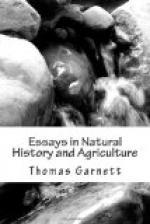In one of the clauses of the bill (I do not remember which, and I have not the bill at hand to refer to) you require that a grating, the bars of which shall not be more than three inches distant from each other, and which shall be placed at the junction of the tail-goit with the river, as well as in front of the wheel. This I presume is to prevent any fish being injured by the wheels, but I assure you that during the twenty-two years in which I have had the management of the works here, I never knew an instance of a Salmon being either killed or hurt by the wheels. Indeed, I do not know half-a-dozen instances of Salmon ever ascending the tail-goit to the wheel, and I must have seen many instances if this was a common occurrence. This may, however, happen, and the fish may be occasionally injured where there is much fall lost, and a strong stream running from a wheel constituted in the old way with open float boards. But the objections to such a plan on the part of the manufacturers will be insuperable, in fact, the accumulation of sticks and leaves in the autumn, and ice in the winter, will be so great at the grating in the tail-goit, that the wheels will be thrown into back water and the works stopped, and all this loss and inconvenience will be incurred because of the possibility of a Salmon being killed or hurt by the wheel. There is not much probability of this frequently happening, because, as I said in my other letter, Salmon seldom migrate except where there are freshes in the rivers, and then there is so much water flowing down the usual course of the stream, that the fish have no inducement to leave it to seek for a passage elsewhere. I would, however, suggest that power be given to conservators to go at all times up the tail-goits and into the wheelhouses, to see that there are no illegal contrivances in them for catching the Salmon and Smolts in their migration, as I have certainly heard of such things occurring.
In Sir Thomas Winnington’s note to my friend, he says we have difficulty enough in endeavouring to obtain support for one day’s clear course; two we could not carry, however desirable. Allow me to suggest, that in endeavouring to carry so little you rouse up your opponents, while there is not enough to stimulate the zeal of your friends, for it will be in vain to look for the zealous co-operation of the proprietors on the upper part of rivers unless you give them some inducement. This one day in the week will not effect, and besides this, you make it illegal to catch Smolts, even with the rod, which is destroying one of the greatest amusements of the anglers, and depriving them of the most delicate of fish, and for no object: because, if the provisions of your bill are carried (without this clause), there will be an abundant supply of fish for all purposes, even after the anglers have enjoyed their sport. I do not see the propriety and utility of prohibiting the killing of Smolts, because if they lived they would become Salmon, any more than I see the propriety of prohibiting the eating of eggs, because if they were hatched and lived long enough they would become barn-door fowls.




